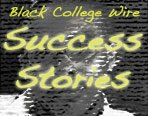| Tenn. State President Goes to Class |

|

|

|
| By Jennifer Butler -- Black College Wire | |
|
Tennessee State University students may have noticed a few non-traditional faces sitting beside them in classes on Monday, Nov. 17. 
TSU Media Relations
TSU President Melvin N. Johnson in history class
The move was the brainchild of SGA President Patrick Walker-Reese, who decided it was necessary after a summer event revealed some outdated views. "This summer at the presidential retreat with the cabinet, I felt like the cabinet was really out of touch, for lack of a better word, with the student experience," said Walker-Reese, a senior history education major from Nashville. "They didn't really know what the student experience was like, but they make decisions that affect a lot of the students. I felt like this was one way to get them in touch." Administrators attended classes all across campus, including radio and television programming and psychology of speech communications. Professors were notified in advance of the administrative appearances, out of respect for university protocol and the classes. Johnson, however, does not think it made a difference. "I don't think professors can change their teaching methods overnight," Johnson said. "Some things can come through even with them being informed." Cabinet members witnessed the highs and lows of students' academic experiences, including some facilities management issues. "It actually brings joy to me that an administrator sees this," began Mario Price, a senior communications major from Memphis and a representative-at-large. "Someone is giving a presentation, and in the middle of it the ceiling begins dripping, on a moldy, soiled spot in the carpet. "In the second class (in the Women's Building), we have an ant infestation," Price continued. "You can't even put your stuff down on the floor." Freshmen were not excluded from the festivities. Kenneth Dorsey, freshman class president, was one of the first-year students shadowed on Monday. He took Michael Freeman, vice-president of student affairs, to class with him. "I felt like overall, it was a really great experience," said Dorsey, a freshman engineering major from Houston. "I felt honored, and respected the fact that they'd come and go with us, as freshmen, from class to class, and to the dorms." President Johnson, who was a keen observer of both professors and students, noticed a few things regarding the engagement level of both parties. He mentioned that, on students' behalves, text messaging, arriving late, and failing to pay attention, could be contributing to what students cite as poor academics. "It's not just one-sided," Johnson said. "It's not that we have to change the way professors approach the classes, but also the way students approach the classes." Participants in the event said they think it went well. Though at the beginning there was some schedule confusion, for the most part, the day for the students was business as usual. "I think it was overwhelmingly successful," Walker-Reese said. "Students got to see a more relaxed side of the administrators. Administrators got a real-life experience of what we experience on a daily basis, of what we experience in the classroom." Administrators as well believe the event went well, and look forward to sharing their findings with one another. "I thought it was a wonderful view-in," Freeman said. The shadowing participants will attend a luncheon together, to discuss the day's events. Johnson has indicated that he does not intend for this to be his last day in the field. "The intention is to do two things," Johnson said. "We want to enlighten administration to what students face in the classroom, and we want administrators to not only be interested in, but connected with the students." There are tentative plans for more shadowing events to occur in the future. Jennifer Butler writes for The Meter, the Tennessee State University student newspaper, which originally published this article. |
|
| Posted Nov. 25, 2008 |
| < Prev | Next > |
|---|



